

AndruasDuarte
I like to learn for the sake of learning.
Other Psy Pearls. For A Life Inspired. Dave Radparvar - A glimpse into my thoughts, passions and adventures. Sandbox Network. Holstee Manifesto Poster. Object permanence. Object permanence is the understanding that objects continue to exist even when they cannot be observed (seen, heard, touched, smelled or sensed in any way).
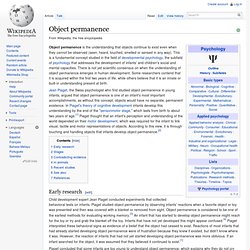
This is a fundamental concept studied in the field of developmental psychology, the subfield of psychology that addresses the development of infants' and children's social and mental capacities. There is not yet scientific consensus on when the understanding of object permanence emerges in human development. Some researchers contend that it is acquired within the first two years of life, while others believe that it is an innate or built-in understanding present at birth.
Jean Piaget, the Swiss psychologist who first studied object permanence in young infants, argued that object permanence is one of an infant's most important accomplishments, as without this concept, objects would have no separate, permanent existence. Early research[edit] Ronchas: tratamientos naturales para combatirlas y prevenirlas. MindBrain : Message: News: Brain Trainers - A Workout for the Mind. Better Thinking: Brain Games For Cognitive Training. One piece of good news is that using the Internet, particularly searching the Web, can slow our normal age-related cognitive decline.

Googling is good for your brain. As Dr. Gary Small, Director of UCLA’s Memory Clinic and Center on Aging, said in an interview, “Our study ‘Your brain on Google: Patterns of cerebral activation during Internet searching’ (American Journal of Geriatric Psychiatry 2009;17:116–126) showed that Internet savvy older adults had significantly greater neural activity searching online compared with internet naive controls. “Our follow up of this study showed that after one week of searching, there were significant increases in brain activity in the previously naive subjects.” From Transcript: Dr.
Gary Small is author of The Memory Bible: An Innovative Strategy For Keeping Your Brain Young. Related book: “The SharpBrains Guide to Brain Fitness: How to Optimize Brain Health and Performance at Any Age”, by Elkhonon Goldberg et al. DSC_7999.jpg (JPEG Image, 567x854 pixels) Gestalt en tu Vida. Xamuel.com. Fighting Music Addiction: An Experiment. Lately I’ve felt like I really want to accomplish more with my time.
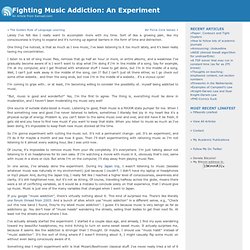
Sort of like a growing pain, like my consciousness is trying to expand and it’s running up against barriers in the form of time and distraction. One thing I’ve noticed, is that as much as I love music, I’ve been listening to it too much lately, and it’s been really taxing my concentration. I listen to a lot of long music files, remixes that go half an hour or more, or entire albums, and a weakness I’ve gradually become aware of is I won’t want to stop what I’m doing if I’m in the middle of a song. Psych Central - Trusted mental health, depression, bipolar, ADHD and psychology information .
De obligadísima LECTURA Error del sistema (Un breve análisis de la crisis del sistema capitalista) Pasado (un poco de historia del dinero) 1.1.
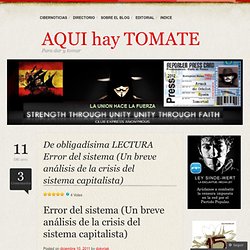
Sobre el patrón oro Debe quedarnos claro que el dinero a pasado de estar respaldado por el oro o ser el oro mismo durante miles de años a ser dinero respaldado absolutamente por nada en menos de un siglo. Fue necesaria una evolución en la cual los Estados emitían billetes y monedas, que daban derecho a su portador a intercambiarlos por oro o plata de las reservas del país. La evolución del respaldo del papel moneda es el siguiente: Actualmente nuestro dinero es dinero fiduciario y no tiene valor por si mismo si no porque nosotros tenemos fe en que lo tiene. Las monedas y billetes fiduciarios que no basan su valor en la existencia de una contrapartida en oro, plata o cualquier otro metal noble o valores, ni en su valor intrínseco, sino simplemente en su declaración como dinero por el Estado y también en el crédito y la confianza (la fe en su futura aceptación) que inspira. 1.2.
C = ACSB / D e = EMP / D 1.3. 1.4. Meme. A meme (/ˈmiːm/ meem)[1] is "an idea, behavior, or style that spreads from person to person within a culture.
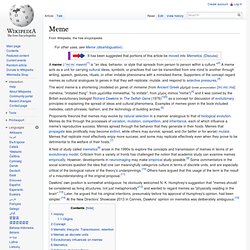
"[2] A meme acts as a unit for carrying cultural ideas, symbols, or practices that can be transmitted from one mind to another through writing, speech, gestures, rituals, or other imitable phenomena with a mimicked theme. Supporters of the concept regard memes as cultural analogues to genes in that they self-replicate, mutate, and respond to selective pressures.[3] The word meme is a shortening (modeled on gene) of mimeme (from Ancient Greek μίμημα Greek pronunciation: [míːmɛːma] mīmēma, "imitated thing", from μιμεῖσθαι mimeisthai, "to imitate", from μῖμος mimos "mime")[4] and it was coined by the British evolutionary biologist Richard Dawkins in The Selfish Gene (1976)[1][5] as a concept for discussion of evolutionary principles in explaining the spread of ideas and cultural phenomena.
Portal del Est de psicologia (2006 - 2011) - Solo se aprende haciendo. Critical and Creative Thinking - home. Critical and Creative Thinking - Critical Thinking. WHAT is it?
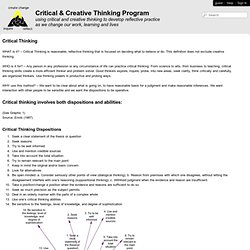
– Critical Thinking is reasonable, reflective thinking that is focused on deciding what to believe or do. This definition does not exclude creative thinking. WHO is it for? – Any person in any profession or any circumstance of life can practice critical thinking. From science to arts, from business to teaching, critical thinking skills create a more efficient thinker and problem solver.
Images. Enlightenment. Music. Literature - Books. People's Pearltrees. Productivity. Psychology. TED Talks. Random knowledge. Help.